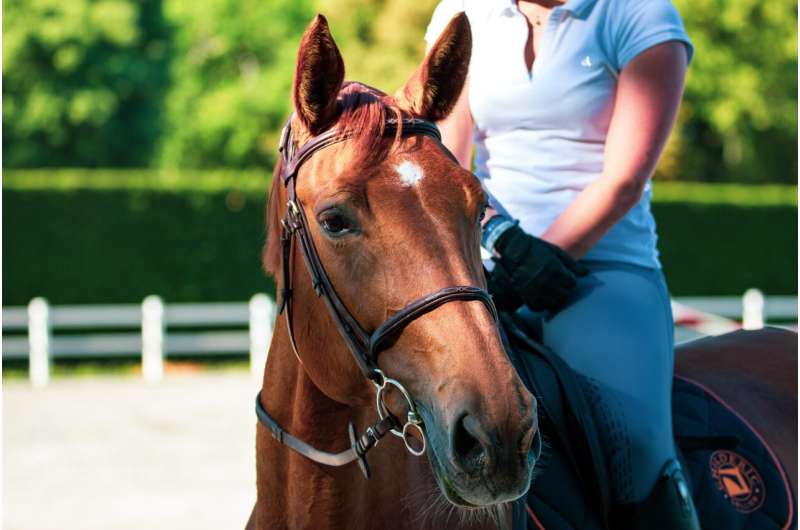This article has been reviewed according to Science X's editorial process and policies. Editors have highlighted the following attributes while ensuring the content's credibility:
fact-checked
peer-reviewed publication
trusted source
proofread
Horse miscarriages offer clues to causes of early human pregnancy loss

A study of horses—which share many important similarities with humans in their chromosomes and pregnancies—revealed that 42% of miscarriages and spontaneous abortions in the first two months of pregnancy were due to complications from an extra set of chromosomes, a condition called triploidy.
"Over that embryonic period [up to eight weeks from conception], triploidy had rarely been reported in mammals outside of women," said Mandi de Mestre, professor of equine medicine at Cornell University. "The study tells us that over the first six weeks of gestation, this will likely be the primary cause of pregnancy loss following natural conception."
de Mestre is the corresponding author of "Naturally Occurring Horse Model of Miscarriage Reveals Temporal Relationship Between Chromosomal Aberration Type and Point of Lethality," published on August 5, 2024 in the Proceedings of the National Academy of Sciences.
Human miscarriages occur in 10–20% of pregnancies and are commonly associated with chromosomal errors, but there have been no suitable animal models that truly duplicate the features of the condition. The new research findings will help veterinarians better understand the causes of pregnancy loss in horses and identifies horses as an excellent model for studying human miscarriage.
"We were able to study the impact of chromosome errors across the entire pregnancy in the horse," de Mestre said. "We found that triploidy is only associated with losses in early pregnancy."
In the study, de Mestre's laboratory at Cornell, and earlier at The Royal Veterinary College, London, received 256 fetus and placenta samples from veterinarians who treated horses with failed pregnancies over a period of 10 years.
Using the samples, the researchers were able to investigate the prevalence of different types of chromosomal copy number errors associated with pregnancy loss. They found that chromosomal errors occurred in 57.9% of pregnancy losses up to day 55 of gestation, in 57.2% of losses between days 56 and 110 and in only 1.4% of losses between days 111 and the end of pregnancy.
Aneuploidy (loss or gain of a single whole chromosome) was mainly associated with miscarriages in the first 10 weeks of pregnancy, while deletions or duplications of only part of a chromosome were found in miscarriages after 110 days. These findings turned out to be remarkably similar to those observed in a number of large studies in women, according to the paper.
Horses are a good model for studying human pregnancies because they have a similar gestation period—11 months compared to nine months in women—and the embryo develops at a similar rate in the early stages. In addition, horse chromosomes have a very similar genetic content to human chromosomes, which makes them particularly relevant for the study of chromosome errors.
Reasons for miscarriage in women in very early pregnancy have been difficult to determine because most fetuses during this period are lost at home, leaving scientists without material—and data—to study. The study's findings provide insight into the frequency of chromosome errors over the equivalent period of the first six weeks of human gestation.
Because of the value of horses and the emotional attachment their owners have to them, horses receive a high level of care, with routine tracking of pregnancies, which then provide extensive data for research.
Other animal models, such as mice, are not comparable to human pregnancies. Mice have a gestation period of about three weeks, and natural pregnancy losses in mice are low.
In terms of equine health, the study provides new details about common chromosomal abnormalities that will likely change the clinical management of pregnancies. For example, if a clinician determines that a horse has a major chromosomal error, they may no longer choose to extend that pregnancy by administering hormones, a common practice in pregnant mares.
The study will also point researchers toward the development of new diagnostic tests for chromosome abnormalities in horse fetuses and investigating molecular mechanisms that lead to these abnormalities.
"This research has provided a foundation for understanding the genetic causes of pregnancy loss in horses, often referred to as pregnancy loss of unknown cause," said Shebl Salem, a postdoctoral researcher in de Mestre's Equine Pregnancy Lab and a co-first author of the study.
Other co-first authors include Jessica Lawson of the Royal Veterinary College in London, United Kingdom; and Donald Miller, de Mestre lab manager.
More information: de Mestre, Amanda M., Naturally occurring horse model of miscarriage reveals temporal relationship between chromosomal aberration type and point of lethality, Proceedings of the National Academy of Sciences (2024). DOI: 10.1073/pnas.2405636121
Journal information: Proceedings of the National Academy of Sciences
Provided by Cornell University





















